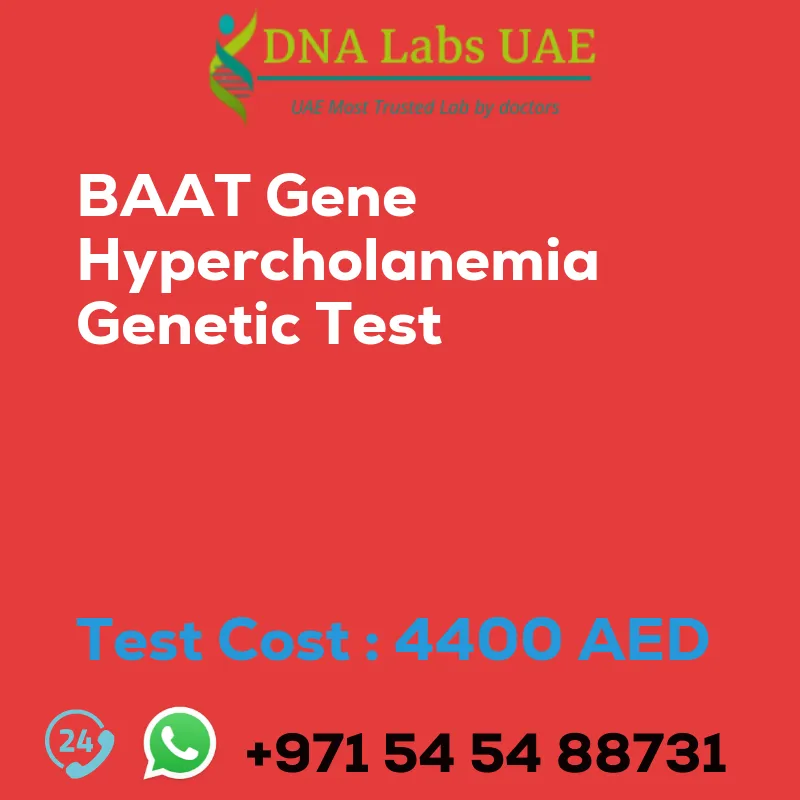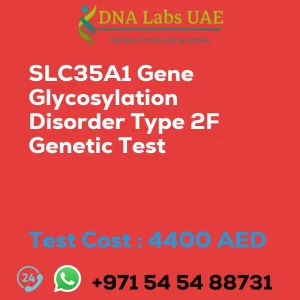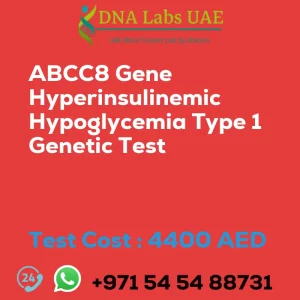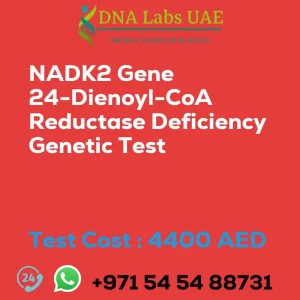BAAT Gene Hypercholanemia Genetic Test
At DNA Labs UAE, we offer the BAAT Gene Hypercholanemia Genetic Test to diagnose and analyze the symptoms of hypercholanemia. This test is designed to identify mutations in the BAAT gene that may be causing the condition.
Test Details
The BAAT gene, also known as bile acid-CoA:amino acid N-acyltransferase, plays a crucial role in the metabolism of bile acids in the liver. Mutations in this gene can lead to hypercholanemia, which is characterized by elevated levels of bile acids in the blood.
Our BAAT Gene Hypercholanemia Genetic Test utilizes NGS (Next-Generation Sequencing) technology to analyze multiple genes simultaneously. This advanced sequencing technology allows for a comprehensive analysis of the BAAT gene, aiding in the accurate diagnosis of hypercholanemia.
Test Components and Price
The cost of the BAAT Gene Hypercholanemia Genetic Test is 4400.0 AED. The test requires a blood sample, extracted DNA, or just one drop of blood on an FTA Card. The report will be delivered within 3 to 4 weeks.
Test Type and Doctor
The BAAT Gene Hypercholanemia Genetic Test falls under the category of Metabolic Disorders. It is recommended to consult a General Physician who specializes in genetics for this test.
Test Department and Pre Test Information
The BAAT Gene Hypercholanemia Genetic Test is conducted in our Genetics department. Before undergoing the test, it is essential to provide the clinical history of the patient. Additionally, a Genetic Counselling session will be conducted to draw a pedigree chart of family members affected by Hypercholanemia. This information helps in understanding the genetic background and inheritance patterns of the condition.
Importance and Benefits of the Test
NGS genetic testing for BAAT gene mutations plays a crucial role in the diagnosis and management of hypercholanemia. It provides valuable information for treatment, genetic counseling, and family planning purposes. By identifying the specific mutations in the BAAT gene, healthcare professionals can offer appropriate guidance and support to patients and their families.
It’s important to note that genetic testing should be ordered and interpreted by healthcare professionals with expertise in genetics, such as genetic counselors or medical geneticists. They possess the knowledge and experience to accurately interpret the test results and provide personalized recommendations.
At DNA Labs UAE, we are committed to providing accurate and reliable genetic testing services. Contact us today to schedule your BAAT Gene Hypercholanemia Genetic Test and take a step towards better understanding and managing your health.
| Test Name | BAAT Gene Hypercholanemia Genetic Test |
|---|---|
| Components | |
| Price | 4400.0 AED |
| Sample Condition | Blood or Extracted DNA or One drop Blood on FTA Card |
| Report Delivery | 3 to 4 Weeks |
| Method | NGS Technology |
| Test type | Metabolic Disorders |
| Doctor | General Physician |
| Test Department: | Genetics |
| Pre Test Information | Clinical History of Patient who is going for BAAT Gene Hypercholanemia NGS Genetic DNA Test A Genetic Counselling session to draw a pedigree chart of family members affected with Hypercholanemia |
| Test Details |
The BAAT gene, also known as bile acid-CoA:amino acid N-acyltransferase, is involved in the metabolism of bile acids in the liver. Mutations in this gene can lead to a condition called hypercholanemia, which is characterized by elevated levels of bile acids in the blood. NGS (Next-Generation Sequencing) genetic testing is a type of genetic test that uses advanced sequencing technology to analyze multiple genes simultaneously. In the context of hypercholanemia, NGS genetic testing can be used to identify mutations in the BAAT gene that may be causing the condition. NGS genetic testing for BAAT gene mutations can help with the diagnosis of hypercholanemia and provide valuable information for treatment and management of the condition. It can also be used for genetic counseling and family planning purposes. It’s important to note that genetic testing should be ordered and interpreted by healthcare professionals with expertise in genetics, such as genetic counselors or medical geneticists. They can provide appropriate guidance and support based on the test results. |








